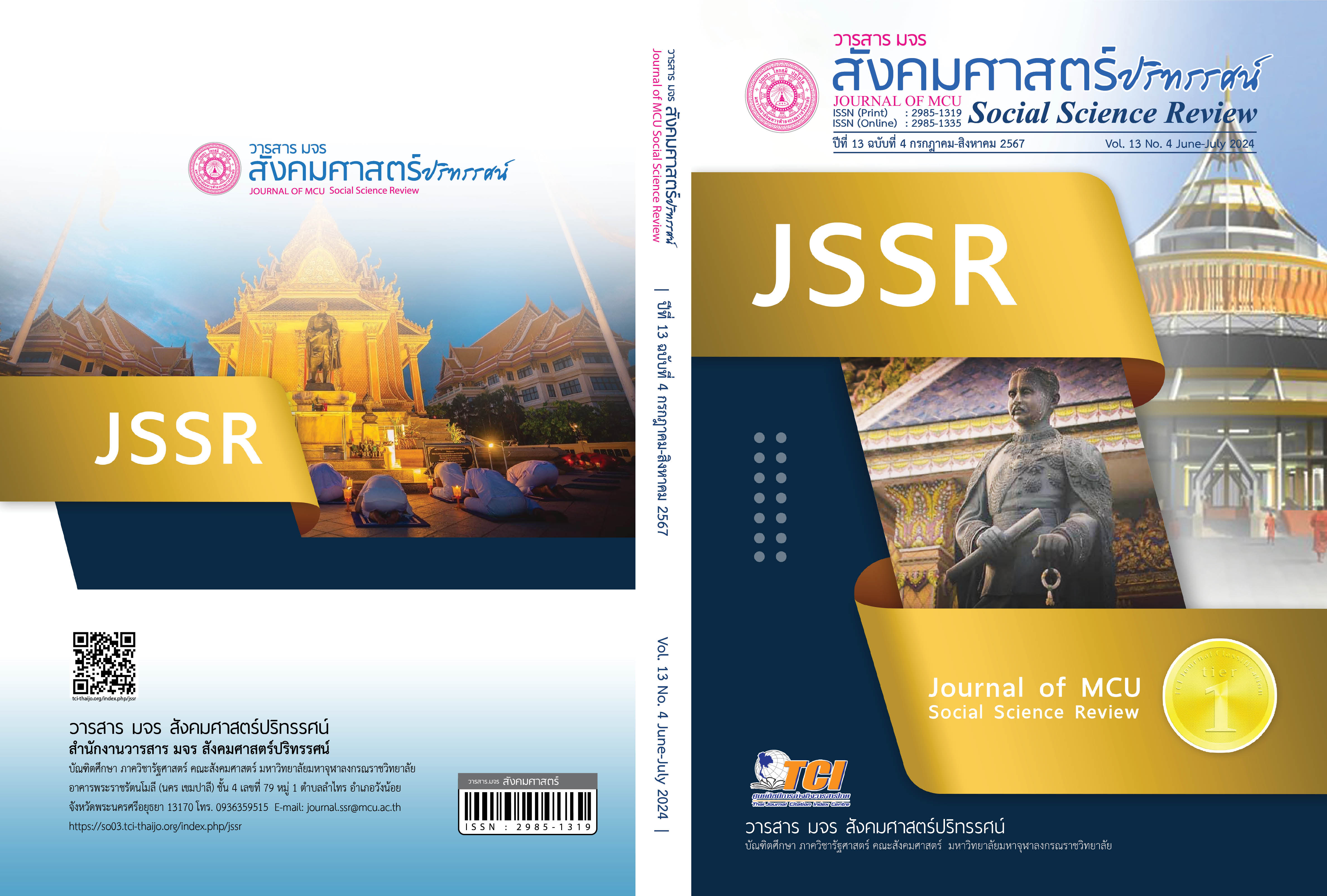การจัดกิจกรรมเพื่อส่งเสริมพัฒนาการเด็กแบบองค์รวมตามทฤษฎีพหุปัญญา
คำสำคัญ:
ปฐมวัย, พัฒนาการเด็กแบบองค์รวม, พหุปัญญาบทคัดย่อ
บทความวิจัยนี้มีวัตถุประสงค์ 1. ศึกษาการจัดกิจกรรมเพื่อส่งเสริมพัฒนาการเด็กแบบองค์รวมตามทฤษฎีพหุปัญญา 2. สร้างและตรวจสอบรูปแบบการจัดกิจกรรมเพื่อส่งเสริมพัฒนาการเด็กแบบองค์รวมตามทฤษฎีพหุปัญญา และ 3. ศึกษาผลการใช้รูปแบบการจัดกิจกรรมเพื่อส่งเสริมพัฒนาการเด็กแบบองค์รวมตามทฤษฎีพหุปัญญา โดยเก็บรวบรวมข้อมูลจากครูผู้สอนระดับปฐมวัย 63 คน และทดลองใช้รูปแบบเพื่อติดตามพัฒนาการเด็กที่เรียนในห้องเรียนของครูอาสาสมัครที่เข้าร่วมโครงการวิจัย 669 คน เครื่องมือที่ใช้ในการวิจัย ได้แก่ แบบสอบถามการจัดกิจกรรม รูปแบบการจัดกิจกรรมเพื่อส่งเสริมพัฒนาการเด็กแบบองค์รวมตามทฤษฎีพหุปัญญา และแบบประเมินพัฒนาการเด็กแบบองค์รวมตามทฤษฎีพหุปัญญา วิเคราะห์ข้อมูลโดยการวิเคราะห์ค่าเฉลี่ย ส่วนเบี่ยงเบนมาตรฐาน และการทดสอบค่าที
ผลการวิจัยพบว่า รูปแบบการจัดกิจกรรมเพื่อส่งเสริมพัฒนาการเด็กแบบองค์รวมตามทฤษฎีพหุปัญญา ประกอบด้วย แนวคิดพื้นฐาน การบูรณาการหน่วยการเรียนรู้ การจัดการเรียนรู้ การใช้สื่อการเรียนรู้ การประเมินผลการเรียนรู้ กิจกรรมตามทฤษฎีพหุปัญญา และพัฒนาการเด็กแบบองค์รวมตามทฤษฎีพหุปัญญา ผลการใช้รูปแบบ พบว่า เด็กที่ได้รับ
การทดลองโดยใช้รูปแบบการจัดกิจกรรมเพื่อส่งเสริมพัฒนาการเด็กแบบองค์รวมตามทฤษฎีพหุปัญญาหลังการทดลองมีพัฒนาการที่ดีขึ้นกว่าก่อนการทดลองอย่างมีนัยสำคัญทางสถิติที่ระดับ .05
เอกสารอ้างอิง
กมลวรรณ อังศรีสุรพร. (2554). การศึกษาความสามารถทางพหุปัญญาของเด็กปฐมวัยที่ได้รับ การจัดกิจกรรมตามรูปแบบพหุปัญญาเพื่อการเรียนรู้โดยใช้นิทานเป็นสื่อ (ปริญญานิพนธ์การศึกษามหาบัณฑิต สาขาวิชาการศึกษาปฐมวัย). กรุงเทพฯ: มหาวิทยาลัยศรีนครินทรวิโรฒ.
ธิดา พิทักษ์สินสุข. (2562). วิกฤตปฐมวัยกระทบอนาคตชาติ. วารสารการจัดการทางการศึกษาปฐมวัย, 1(1), 77-89.
เยาวพา เดชะคุปต์. (2553). การพัฒนารูปแบบพหุปัญญาเพื่อการเรียนรู้สำหรับการจัดการศึกษาในบริบทของสังคมไทย. วารสารศรีนครินทรวิโรฒวิจัยและพัฒนา (สาขามนุษยศาสตร์และสังคมศาสตร์), 2(1), 133-145.
ศุภสิทธิ์ พรรณารุโณทัย. (2557). พัฒนาเด็กไทย สิ่งสำคัญที่ไม่ควรมองข้าม. สืบค้น 6 กันยายน 2562, จาก https://bit.ly/3vcXcoF
สุริยเดว ทรีปาตี. (2557). พัฒนาเด็กไทย สิ่งสำคัญที่ไม่ควรมองข้าม. สืบค้น 6 กันยายน 2562, จาก https://www.thaihealth.or.th
สำนักงานเลขาธิการสภาการศึกษา. (2550). การจัดการเรียนรู้แบบบูรณาการสู่พหุปัญญา. กรุงเทพฯ: กลุ่มส่งเสริมนวัตกรรมการเรียนรู้ของครูและบุคลากรทางการศึกษา สำนักมาตรฐานการศึกษาและพัฒนาการเรียนรู้ กระทรวงศึกษาธิการ.
_____. (2560). แผนการศึกษาแห่งชาติ พ.ศ. 2560-2579. กรุงเทพฯ: กระทรวงศึกษาธิการ.
Gardner, H. (1983). Frames of mind: The theory of multiple intelligences. New York, NY: Basic Books.
_____. (1999). The disciplined mind: What all students should understand. New York, NY: Simon & Schuster.
Johnstone, A. et al. (2019). An active play intervention to improve physical activity and fundamental movement skills in children of low socioeconomic status: feasibility cluster randomised controlled trial. Pilot and Feasibility Studies. 5(45), 1-13.
Mulia, D. (2016). Towards Play-Based Learning Practice. Kajian Linguistik dan Sastra, 1(1), 44-47.
ดาวน์โหลด
เผยแพร่แล้ว
รูปแบบการอ้างอิง
ฉบับ
ประเภทบทความ
สัญญาอนุญาต
ลิขสิทธิ์ (c) 2024 วารสาร มจร สังคมศาสตร์ปริทรรศน์

อนุญาตภายใต้เงื่อนไข Creative Commons Attribution-NonCommercial-NoDerivatives 4.0 International License.
เพื่อให้เป็นไปตามกฎหมายลิขสิทธิ์ ผู้นิพนธ์ทุกท่านต้องลงลายมือชื่อในแบบฟอร์มใบมอบลิขสิทธิ์บทความให้แก่วารสารฯ พร้อมกับบทความต้นฉบับที่ได้แก้ไขครั้งสุดท้าย นอกจากนี้ ผู้นิพนธ์ทุกท่านต้องยืนยันว่าบทความต้นฉบับที่ส่งมาตีพิมพ์นั้น ได้ส่งมาตีพิมพ์เฉพาะในวารสาร มจร สังคมศาสตร์ปริทรรศน์ เพียงแห่งเดียวเท่านั้น หากมีการใช้ภาพหรือตารางหรือเนื้อหาอื่นๆ ของผู้นิพนธ์อื่นที่ปรากฏในสิ่งตีพิมพ์อื่นมาแล้ว ผู้นิพนธ์ต้องขออนุญาตเจ้าของลิขสิทธิ์ก่อน พร้อมทั้งแสดงหนังสือที่ได้รับการยินยอมต่อบรรณาธิการ ก่อนที่บทความจะได้รับการตีพิมพ์ หากไม่เป็นไปตามข้อกำหนดเบื้องต้น ทางวารสารจะถอดบทความของท่านออกโดยไม่มีข้อยกเว้นใดๆ ทั้งสิ้น





